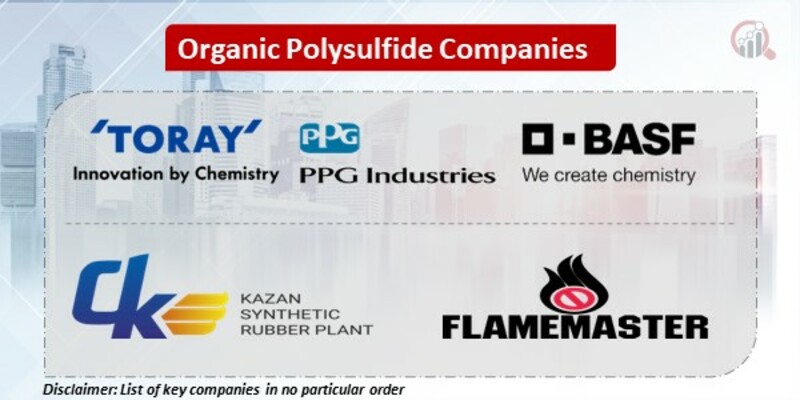Top Industry Leaders in the Organic Polysulfide Market
 The organic polysulfide market, though seemingly niche, simmers with fierce competition and relentless innovation. These versatile polymers, renowned for their exceptional resistance to heat, chemicals, and solvents, find applications across diverse industries, from aerospace and automotive to construction and marine. Navigating this dynamic landscape requires a keen understanding of the key players, their competitive strategies, and the factors shaping market share.
The organic polysulfide market, though seemingly niche, simmers with fierce competition and relentless innovation. These versatile polymers, renowned for their exceptional resistance to heat, chemicals, and solvents, find applications across diverse industries, from aerospace and automotive to construction and marine. Navigating this dynamic landscape requires a keen understanding of the key players, their competitive strategies, and the factors shaping market share.
Market Leaders and Strategies:
-
Kazan Synthetic Rubber Plant (KSRP): The undisputed global leader, KSRP leverages its vast production capacity and cost-effective manufacturing in Russia to dominate the market. They cater to a broad range of applications with their Thioplast* brand polysulfides.
-
Toray Fine Chemicals Co., Ltd.: This Japanese giant focuses on high-performance, specialty polysulfides for demanding applications like aerospace sealants and fuel lines. Their emphasis on quality and technical expertise fosters strong customer loyalty.
-
PPG Industries: A diversified chemical giant, PPG offers a comprehensive portfolio of polysulfide sealants and adhesives under the Thiokol* brand. Their focus on market-specific solutions and strategic acquisitions helps them maintain a strong presence.
-
Flamemaster Corporation: This US-based company specializes in flame-retardant polysulfides for the construction and transportation industries. Their innovative product offerings and commitment to safety regulations differentiate them in the market.
-
BASF SE: While not a dedicated polysulfide producer, BASF enters the market through its acquisition of Chemetall, a manufacturer of high-performance sealants and adhesives with a strong presence in the automotive and aerospace sectors.
Factors Influencing Market Share:
Beyond brand recognition, several key factors influence market share in the organic polysulfide market:
-
Product Innovation: Developing new polysulfide formulations with improved properties like higher temperature resistance, faster curing times, or enhanced environmental compatibility opens doors to new applications and attracts customers. Recent examples include KSRP's Thioplast* E-700 for high-temperature gaskets and PPG's Thiokol* LP-32 for low-VOC adhesives.
-
Regional Focus: Understanding and catering to regional growth trends is crucial. Asia Pacific, driven by rapid infrastructure development and industrial expansion, presents significant opportunities for players like KSRP and Toray.
-
Sustainability Initiatives: The growing demand for eco-friendly solutions is driving the development of bio-based or readily recyclable polysulfides. BASF's efforts in bio-based raw materials for their sealants and adhesives exemplify this trend.
-
Vertical Integration: Integrating backward to secure raw materials or forward into downstream applications can offer cost advantages and market control. KSRP's control over key raw materials like mercaptans gives them a significant edge.
Key Players:
Kazan Synthetic Rubber Plant (Russia)
Toray Fine Chemicals Co., Ltd (Japan)
PPG Industries, Inc. (U.S)
Flamemaster Corporation (U.S.)
BASF (Germany).
Recent Developments:
-
September 2023: Regional expansion continues with KSRP's new production facility in India and Toray's strategic partnership with a distributor in Latin America.
-
October 2023: Innovation takes center stage with PPG's development of a self-healing polysulfide sealant and KSRP's launch of a high-performance sealant for extreme environments.
-
November 2023: Regulatory concerns emerge with stricter environmental regulations in Europe impacting raw material sourcing for some players.
-
December 2023: Industry collaboration flourishes with the formation of a consortium to develop standardized testing methods for organic polysulfides.





 The organic polysulfide market, though seemingly niche, simmers with fierce competition and relentless innovation. These versatile polymers, renowned for their exceptional resistance to heat, chemicals, and solvents, find applications across diverse industries, from aerospace and automotive to construction and marine. Navigating this dynamic landscape requires a keen understanding of the key players, their competitive strategies, and the factors shaping market share.
The organic polysulfide market, though seemingly niche, simmers with fierce competition and relentless innovation. These versatile polymers, renowned for their exceptional resistance to heat, chemicals, and solvents, find applications across diverse industries, from aerospace and automotive to construction and marine. Navigating this dynamic landscape requires a keen understanding of the key players, their competitive strategies, and the factors shaping market share.





